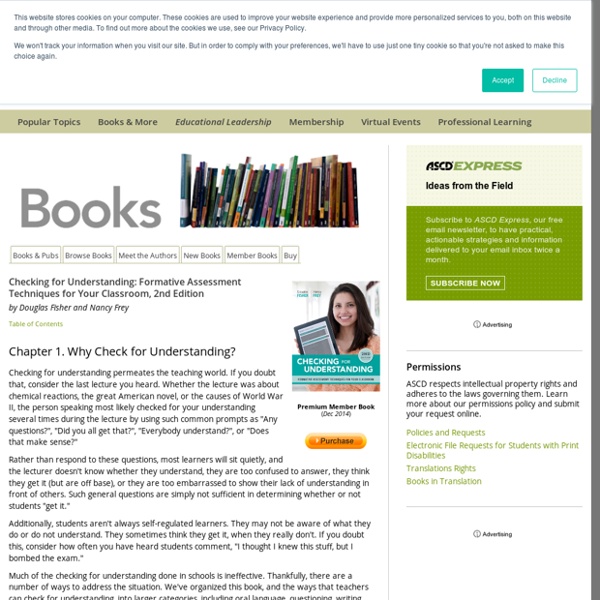



http://www.ascd.org/publications/books/115011/chapters/Why-Check-for-Understanding%C2%A2.aspx
Related: Assessment for Learning • drfeesFantastic Comprehensive List of Assessment Tools for Teachers About ETR Community EdTechReview (ETR) is a community of and for everyone involved in education technology to connect and collaborate both online and offline to discover, learn, utilize and share about the best ways technology can improve learning, teaching, and leading in the 21st century. EdTechReview spreads awareness on education technology and its role in 21st century education through best research and practices of using technology in education, and by facilitating events, training, professional development, and consultation in its adoption and implementation.
ASSESSMENT DOWNLOADS – TRAILS Archive for Grades 3, 6, 9, 12 Below are links to the TRAILS assessments in ready-to-print PDF format, with answer keys included for easy grading. For each grade, two general assessments are provided that draw upon items from each of the five TRAILS categories. Additionally, each grade has a ten-item assessment specific to each of the categories as well. (TRAILS Category definitions here) If you prefer to create your own assessments, use the individual item search feature on the Item Bank page.
3 Guidelines to Eliminating Assessment Fog Consider what it's like to drive through a heavy morning fog. It may be a busy highway where brake lights blink in and out of the haze, or a neighborhood road where the familiar details of buildings and trees are obscured by a gray curtain that implies shapes without clear form. Such driving conditions bring tension as we seek any details that will keep us on the road, and not hit a car or miss a sharp turn. Assessment fog holds similar dangers of miscalculation for accurately diagnosing student needs. Unlike road fog, which is obvious (you know you're in it), assessment fog can be invisible.
Reflecting on reflection This is hardly wasting time. It is this kind of sitting that allows the mind to wander, to wonder and to speculate. Sven Birkert calls this process "resonance" in The Gutenberg Elegies: Resonance—there is no wisdom without it. Resonance is a natural phenomenon, the shadow of import alongside the body of fact, and it cannot flourish except in deep time. Library Girl's Picks: The Best Digital Tools for Formative Assessment On Monday, I had the opportunity to participate in another fab edition of the TL Virtual Cafe webinar series. This month's PD offering was an "Edutech Smackdown" featuring the Queen of All Things Library: Joyce Valenza. I love these smackdown sessions because they are the ultimate crowdsourced PD. Everybody grabs a slide (or two or ten) and when their time comes, takes the mic to share something they love.
The Qualitative Formative Assessment Toolkit: Document Learning with Mobile Technology What is qualitative formative assessment? Some call it anecdotal or informal assessment. However, such designations imply passivity -- as if certain things were captured accidentally. 10 Quick Assessments You Can Perform In 90 Seconds 10 Assessments You Can Perform In 90 Seconds by TeachThought Staff Good assessment is frequent assessment. Any assessment is designed to provide a snapshot of student understand—the more snapshots, the more complete the full picture of knowledge. On its best day, an assessment will be 100% effective, telling you exactly what a student understands. More commonly, the return will be significantly lower as the wording of questions, the student’s sense of self-efficacy, or other factors diminish their assessment performance.
Teachers share formative assessment strategies that work Ed. note: Today’s students have too many tests to take—but today’s teachers still need insight into their classes’ knowledge and skills. Adding new tests every time students need to prove mastery rarely seems like the right answer. For some classrooms, the solution lies in formative assessments, which gauge their students’ understanding and personalize their lessons in real time. Here, two educators share how formative assessments are transforming their students’ learning across the board. Dawn Nelson, school library media specialist Assessment, Evaluation, and Curriculum Redesign What is curriculum redesign? This workshop is intended to help you rethink, and perhaps redesign, how you plan your classes. The first step is to determine what you want your students to learn, says our content expert Heidi Hayes Jacobs 1. Then you need to assess and evaluate your teaching strategies to determine if they truly support the kind of learning you are trying to achieve in your classroom.